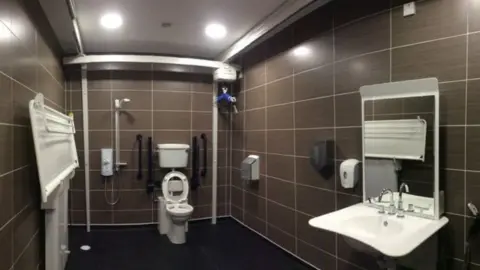Paralympian calls for mandatory 'changing places' toilets
 BBC
BBCA lack of appropriate changing spaces for people with disabilities is degrading, a Paralympian has said.
Anne Wafula-Strike, who was forced to wet herself on a train without a working disabled toilet, has backed calls for a law change.
More than 50,000 people have signed a petition urging the government to make it mandatory for such spaces to be provided in public buildings.
The government said it was working with charities to improve facilities.
Ms Wafula-Strike, from Harlow, will deliver the petition to Downing Street.
Campaigners want changing places toilets to be installed in public places such as large railway stations, airports and motorway services.
The toilets have space for a wheelchair user and two carers, with a height-adjustable bed and a hoist, alongside other equipment normally found in disabled toilets.
"It's very humiliating in this day and age people are still being laid on dirty toilet floors to be changed," said Ms Wafula-Strike.
'Horror stories'
"No-one thinks about how easy it is to catch infections," she said.
"Even the parents and carers who are lifting them on and off the floors could suffer with their backs.
"It's just terrible what is happening in the community - the government should listen to what we're asking for and make sure the law is changed."
 Aveso Ltd
Aveso LtdIn 2017, Ms Wafula-Strike was given compensation after wetting herself on a train when the disabled toilet was not working.
She said she had heard "a lot of horror stories" about parents and carers having to lie children or vulnerable adults on dirty floors.
Lorna Fillingham, who started the petition to make the spaces compulsory, said there were currently only 1,053 changing places in the UK.
She described it as "unsafe, unreasonable and inhumane for anyone to be denied access to a facility which meets their continence".
Ms Fillingham will join Ms Wafula-Strike when the petition is delivered.
A spokesman for the Ministry of Housing, Communities and Local Government said the government was working with Mencap and the Changing Places campaign to improve facilities.
"There are now 1,060 of these toilets across the UK, up from just 140 in 2007, and we have helped fund the development of a new website so people know where to find them," he added.
